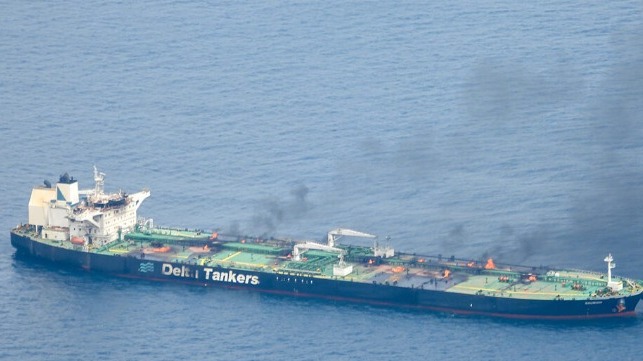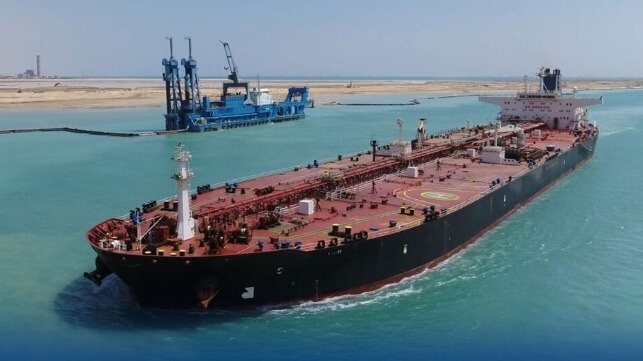Report: Houthis Are Earning $2 Billion a Year by Shaking Down Shipowners

An as-yet-unreleased UN report suggests that Yemen's Houthi rebels have figured out a way to monetize their blockade of the Red Sea: insiders report that the group is operating a multi-billion-dollar tolling operation on the strategic waterway, extracting covert payments from shipowners in exchange for the right to pass safely. If accurate, the safe passage tolls may be among the group's largest sources of income, and would give the Houthis a significant financial incentive to continue attacks on shipping - regardless of the group's ideological motives.
In a long-running research project on the conflict in Yemen, a panel of experts compiled a 500-plus page report for the UN Security Council on Houthi capabilities, finances and alliances. The findings depict an organization that has grown rapidly, both at home and in its near abroad. The Houthi militia has developed a sophisticated international network for shipping, money laundering, smuggling, recruitment and piracy, earning revenue at multiple touch points along the way.
The latest revenue opportunity is linked to the group's politically-motivated blockade of shipping on the Red Sea, enforced through prolific missile and drone attacks. The Houthis launched more than 130 strikes on merchant ships from last November through the end of July, the expert panel assessed. "The group’s shift to actions at sea increased their influence in the region," the panel wrote. "Such a scale of attacks, using weapon systems on civilian vessels, had never occurred since the Second World War."
Houthi leaders claim that their ballistic missile and drone attacks are targeted at ships linked to Israel and its allies. In practice, the group has repeatedly attacked a wide variety of vessels with no clear connection to Israel or the West. Some of the targeted ships have even been carrying cargoes for Houthi-supporting nations, including the group's primary sponsor, Iran.
While many analysts have put the scattered attack pattern down to faulty targeting, the UN panel's conversations with local shipbrokers suggest that Houthi forces also have a financial method for target selection. Shipowners can quietly pay the group a fee for a safe transit, implying that the shipowners who do not pay might have an unsafe transit.
"The sources estimate the Houthis’ earnings from these illegal safe-transit fees to be about $180 million per month," the panel reported, noting that it has not been able to verify the information independently.
If the report is accurate, the Houthis could be generating more revenue from safe-transit fees than they earn by taxing petroleum imports, one of their biggest sources of income. If Houthi leaders ever agreed to cease strikes on Red Sea shipping, the group would be giving up more than $2 billion a year in income, along with a substantial source of regional influence and leverage.
The report also provides extensive details on the Houthis' ties to terrorist organizations (Al-Qaeda, Al-Shabaab and Hezbollah) and pirate action groups in Somalia, as well as details of its well-known links to the Iranian military apparatus and its "Axis of Resistance."
"The scale, nature and extent of transfers of diverse military materiel and technology provided to the Houthis from external sources, including financial support and training of its combatants, is unprecedented," the panel concluded.
Egyptian Officials Cite “Severe Loss” at One Year Mark for Houthi Attacks

Egyptian officials quantified the severe level of economic damage to the country’s economy as the Houthis closed in on the first anniversary of the launch of their assaults on commercial shipping in the Red Sea. Egypt emphasized the impact while it was meeting with the Secretary-General of the International Maritime Organization Arsenio Dominguez while reiterating its commitment to maintaining freedom of navigation in the vital seaway.
Dominguez was touring the Red Sea region and meeting with leaders in Djibouti, Egypt, Oman, Saudi Arabia, and Yemen. They discussed the current situation while Dominguez said the trip was meant to also express support for freedom of navigation as well as concern for innocent seafarers.
Egypt cited the dramatic economic impact as transits of the Suez Canal have declined. After record levels and a strong outlook for canal operations, reports indicate that overall traffic is down between 60 and 70 percent in the Suez Canal. The vast majority of containerships and all cruise ships diverted while an increasing number of bulkers, tankers, and car carriers have also rerouted. This comes despite the U.S. and EU efforts to maintain navigation and suppress the attacks by the Houthi. The past few months have shown a significant decline in the number of missile and drone attacks and long gaps between staging attacks.
Egyptian Foreign Minister Badr Abdel Aati however reported that the loss of traffic has cost the Egyptian economy around $6 billion in the past year. He emphasized to the IMO leader the critical role the canal income plays to the country.
It is just short of a year since Houthi forces boarded the car carrier Galaxy Leader on November 19, 2023, and commandeered it into a port holding the crewmembers. Dominguez sought to call attention to the crew which remain captive despite outreach by the Philippines and others to have the crew released.
Egyptian officials also emphasized that they are committed to maintaining open transit. This came as there was an online uproar after an Israeli warship was spotted transiting the Suez Canal over the weekend.
They responded to the online reports citing the Constantinople Convention, which was signed in 1888, that established international expectations of free transit. The Suez Canal Authority noted that it provides that “the Suez Maritime Canal shall always be free and open, in time of war as in time of peace, to every vessel of commerce or of war, without distinction of nationality.” They said that the authority remains legally and morally bound to uphold the agreements.
The Houthis however marked the upcoming one-year mark with the leader of the rebel group saying that the total number of targeted ships reached 202, which they called “an important achievement in every sense of the word.” The group’s spokesperson vowed that they would continue the attacks and not distinguish between vessels that had been sold and companies that trade with Israel.
Last week, CEO of Maersk Vincent Clerc said that his company as well as the new Gemini Cooperation with Hapag-Lloyd expected the disruptions would continue well into 2025. The new alliance finalized its routing plans focused on the diversions around Africa. Other carriers however continue to selectively send vessels through the Red Sea and Suez Canal but are delayed waiting for naval escorts to enhance security.
No comments:
Post a Comment